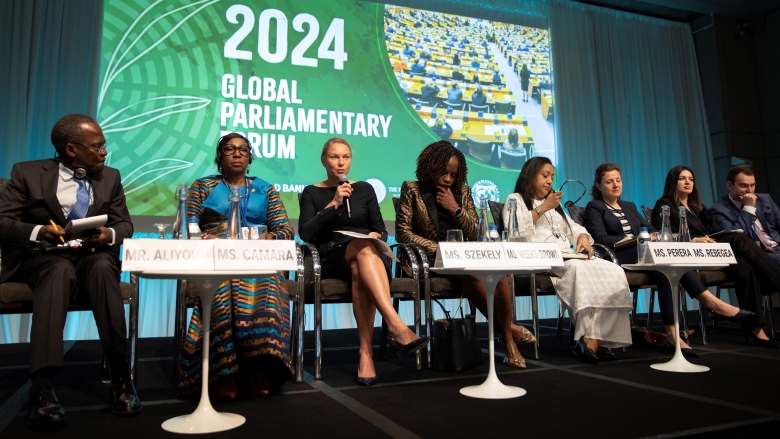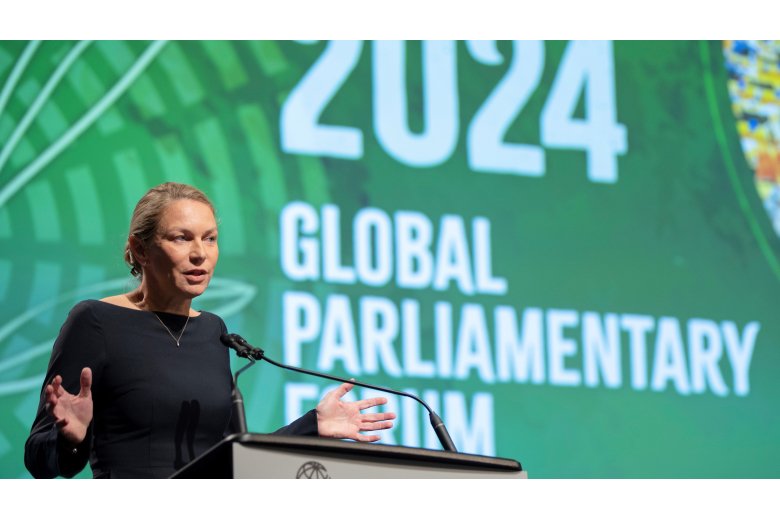On April 16, World Bank Accountability Mechanism Secretary Orsolya Székely told global parliamentarians that accountability must be central to the World Bank’s mission and urged them to use their network to find ways to make it easier for those negatively affected by development projects to speak up earlier.
The World Bank aims to “deliver good for the people and to deliver good for the environment. Development does not happen without accountability. A ‘bigger and better’ Bank must mean accountability is a central part of it,” said Ms. Székely, referencing the World Bank’s new vision in remarks to the 2024 Global Parliamentary Forum at the World Bank-International Monetary Fund (IMF) Spring Meetings.
The Bank sometimes works in challenging environments and “accountability in this challenging environment is even more important,” Ms. Székely told the forum session titled, “Enhancing Accountability and Governance for Better Development Results: The Role of Parliamentarians.”
The forum is a flagship annual event jointly organized by the World Bank Group, the IMF and The Parliamentary Network. It gathers 150–200 influential legislators from around the world, who are instrumental advocates of the International Development Association and capital increases, to enhance their understanding of development issues as well as to share best practices that can be tailored to their country contexts.
Founded in 2000, the Parliamentary Network is an independent network of more than 1,500 parliamentarians in 158 World Bank and IMF member countries. The mission of the Network, which is funded by the World Bank Group and the IMF, is to facilitate dialogue and knowledge sharing and to increase transparency and accountability in the development cooperation process by fostering the oversight role of parliaments.
Ms. Szekely said the World Bank Accountability Mechanism is a “strong tool” that provides “agency” to project-affected people to voluntarily bring forth complaints and decide whether to seek recourse from either of the Accountability Mechanism’s two constituent parts—the Inspection Panel, which carries out compliance investigations, or the Dispute Resolution Service, which leads mediation efforts.
“The World Bank Accountability Mechanism is out there to serve the people,” she said.
The dispute-resolution process brings the borrower into play to help promote solutions, according to Ms. Szekely, who asked the parliamentarians, “How can we do more for accountability? How can we each contribute with our own respective fields and deliver something that is much more than just the minimum or just what we have to do, but even go further, doing good for those people who are out there and who benefit from development?”
A recurring complaint to the Accountability Mechanism is a lack of proper consultation between the World Bank and communities, and Ms. Szekely urged the parliamentarians to encourage those people affected by development to speak up promptly, and without fear of threats or reprisals, when they have project concerns.

The Parliamentary Network, she said, “can create an environment where speaking up is much easier and transparency is a given. We come in much later when we learn of the problems, but I think your presence is key in understanding what could be done better early on.”
Others speaking at the session were: Kandia Camara, senator and speaker of the Senate in Côte d’Ivoire; Rhoda Weeks-Brown, general counsel and director of the IMF Legal Department; Nadishani Perera, executive director of Transparency International Sri Lanka; Corina Rebegea, an advisor on anti-corruption at the National Democratic Institute; Jeta Statovci, a member of parliament in Kosovo and; Iaroslav Zheleznyak, a member of parliament in Ukraine. Fadil Aliyoum, a member of parliament in Cameroon, moderated the session.
Learn more about the Parliamentary Network here.

